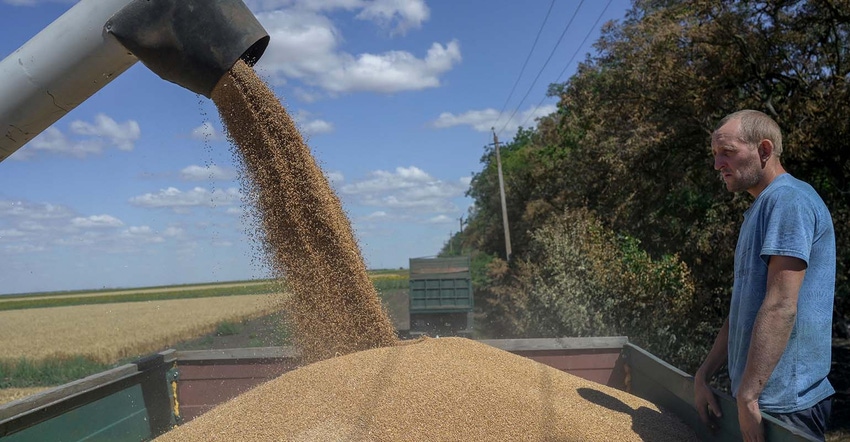
Under a deal brokered under the United Nations and Turkey, leaders from Ukraine and Russia signed a deal to allow Ukrainian grain exports to resume. Full details of the plan were not released; however, it is expected that some 22 million tonnes worth of Ukrainian grain will now be available on the global market.
Russian Defense Minister Sergei Shoigu and Ukrainian Infrastructure Minister Oleksandr Kubrakov signed separate but identical "mirror" deals with Turkish Defense Minister Hulusi Akar and UN Secretary-General Antonio Guterres, according to Reuters.
The accord involves shipments from three Ukrainian ports: Odesa, Chornomorsk and Pivdennyi, says Guterres. These three ports accounted for just over half of Ukraine’s seaborne grain exports in the 2020-21 season, according to UkrAgroConsult data.
“Today, there is a beacon on the Black Sea. A beacon of hope – a beacon of possibility – a beacon of relief in a world that needs it more than ever,” Guterres says in remarks at the signing of the deal. “This is an unprecedented agreement between two parties engaged in bloody conflict.”
In an interview with Turkey’s NTV news, Guterres says the grain corridor deal is valid for three months but can be extended if needed.
Germany-based broadcaster Deutsche Wells reported that parties have agreed that ships bound for Ukraine will first be searched to ensure no weapons or other military equipment are on board. DW also reports that searches will also take place when ships carrying grain from Ukrainian ports want to move in the other direction through the Bosphorus Strait.
In April, after being received by President Erdoğan, Guterres says he met with Russian President Vladimir Putin and Ukrainian President Volodymyr Zelenskyy to propose a plan for solutions and has been working every day since.
“Since the war started, I have been highlighting that there is no solution to the global food crisis without ensuring full global access to Ukraine’s food products and Russian food and fertilizers,” Guterres says.
The supervision of the plan will be coordinated from a joint center in Istanbul, according to Erdogan. Defense Minister Sergei Shoigu signed the deal for Russia and Infrastructure Minister Oleksandr Kubrakov signed for Ukraine in a separate accord.
“This initiative must be fully implemented, because the world so desperately needs it to tackle the global food crisis,” he says.
Solving food crisis
Guterres says the deal “will bring relief for developing countries on the edge of bankruptcy and the most vulnerable people on the edge of famine. And it will help stabilize global food prices which were already at record levels even before the war – a true nightmare for developing countries.”
Mercy Corps Chief Executive Officer Tjada D’Oyen McKenna welcomed the deal, but also recognized it will not solve the global food catastrophe.
“If respected and enacted in good faith, today’s deal to protect Ukrainian grain exports through the Black Sea will help ease grain shortages, but let’s be clear - this will not end or significantly alter the trajectory of the worsening global food crisis,” McKenna says.
“Unblocking Ukraine’s ports will not reverse the damage war has wreaked on crops, agricultural land and agricultural transit routes in the country; it will not significantly change the price or availability of fuel, fertilizer and other staple goods that are now beyond the reach of many, particularly in lower-income countries; and it will certainly not help the majority of the 50 million people around the world inching closer to famine stave off starvation,” McKenna continues.
“Today’s global food catastrophe goes far beyond the 20 million tons of grain that have been stuck in Ukraine. Spiking fuel prices are driving up the cost of staple goods across nearly every country where we work,” McKenna adds.
In parts of Somalia, where hundreds of thousands of people are on the brink of famine, Mercy Corps has seen the price of cooking oil, beans, rice, sugar and flour nearly double since the start of the Ukraine conflict, and fertilizer prices have increased by 75%. In Yemen, families are forced to choose who receives a single food ration when they used to receive four. In Northwest Syria, food prices have increased upwards of 67%. From Colombia to Guatemala, farmers the organization works with can’t get their crops to market because fuel has become too expensive to travel.
“None of this will be solved by the end of the blockade,” McKenna states.
A record fourth failed season of rains in the Horn of Africa has decimated food production, robbed people of their economic assets, and pushed 18.4 million people into acute food insecurity.
“Emergency cash, food, and nutrition assistance are vital in places like Yemen, Somalia, and Afghanistan where children are dying daily of hunger. Beyond immediate assistance, urgent action must be taken to strengthen agricultural food systems: scale climate-resilient agricultural production and boost support for local agriculture by providing smallholder farmers the information, financial, and regulatory support they need to help their communities and countries reduce reliance on imports,” McKenna continues.
About the Author(s)
You May Also Like






